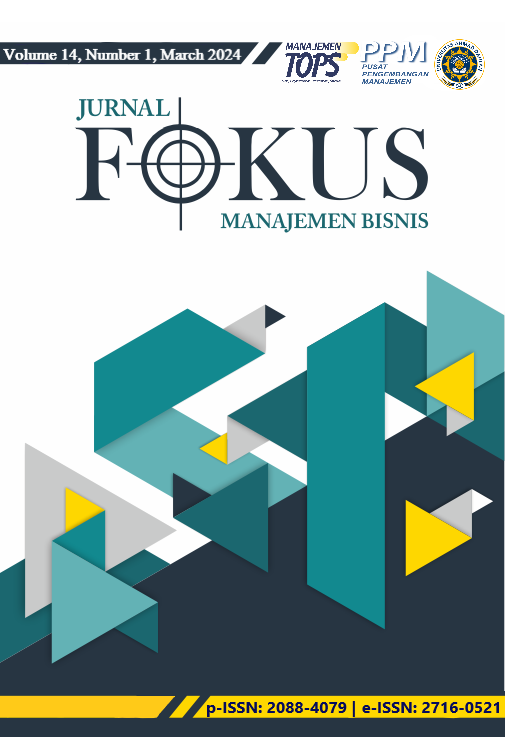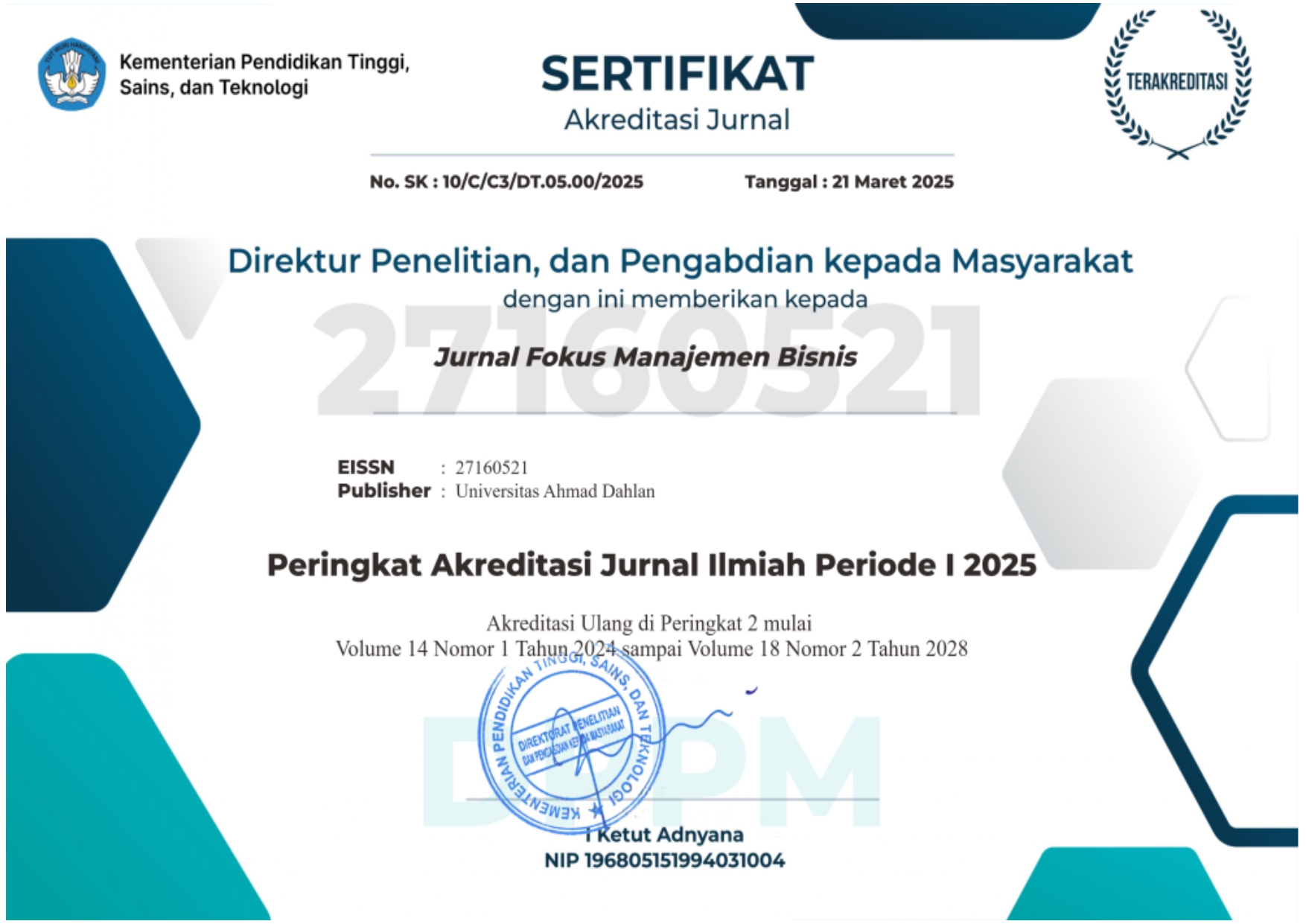The mediating role of customer loyalty on the effect of celebrity endorsement to impulse buying behavior
DOI:
https://doi.org/10.12928/fokus.v14i1.10228Abstract
Consumer behavior in purchasing products can be influenced by various internal and external factors. Both these factors can encourage individuals to purchase a product suddenly or unplanned in advance. The factors that allegedly influence consumers’ impulse buying are celebrity endorsements and customer loyalty. This study analyzes the effect of celebrity endorsements on impulse buying behavior by mediating customer loyalty. This research used Lazada's e-commerce service in Yogyakarta with a total of 80 respondents. The data obtained were then processed using the Smart PLS application in the form of validity, reliability, and direct and indirect hypothesis tests. Based on the results of the data processing, it can be concluded that the four research hypotheses are accepted. Celebrity endorsements have been shown to have a positive effect on impulse buying behavior, celebrity endorsements have been shown to have a positive effect on customer loyalty, customer loyalty has a positive effect on impulse buying behavior, and customer loyalty has been shown to mediate celebrity endorsement relationships and impulse buying behavior.
References
Adnan, A., Jan, F. A., Ali, A., & Shah, S. A. (2018). Relationship between celebrity endorsements & consumer purchase intention. Contemporary Issues in Business & Economics, 179.
Adnan, N. F., & Osman, S. (2022). Factors influencing online impulse buying behavior during covid-19 pandemic. International Journal of Academic Research in Business and Social Sciences, 12(12). https://doi.org/10.6007/ijarbss/v12-i12/16015
Ajzen, I. (1991). The theory of planned behaviour: Reactions and reflections. Psychology and Health, 26(9), 1113–1127. https://doi.org/10.1080/08870446.2011.613995
Alsmadi, S. (2006). The power of celebrity endorsement in brand choice behavior: An empirical study of consumer attitudes in Jordan. Journal of Accounting - Business & Management, 13.
Aruna, S., & Santhi, P. (2015). Impulse purchase behavior among generation-Y. IUP Journal of Marketing Management, 14(1).
Audi, M., Masri, R. Al, & Ghazzawi, K. G. (2015). The effect of celebrity endorsement on creating brand loyalty: An application on the Lebanese cosmetic sector’s demand. International Journal of Business Management & Economic Research, 6(5).
Bañares, M. V., Baniqued, A. M., Landicho, A. C. A., Rose, M., & Soriano, J. R. (2020). Cognitive and affective aspects of male and female in impulsive buying tendency on online shopping. Journal of Applied Managerial, 5(1), 431–441.
Baniya, R. (2017). Components of Celebrity Endorsement Affecting Brand Loyalty of Nepali Customers. Journal of Business and Management Research, 2(1–2). https://doi.org/10.3126/jbmr.v2i1-2.18151
Belch, M. A., & Belch, G. E. (2013). The future of creativity in advertising. Journal of Promotion Management, 19(4). https://doi.org/10.1080/10496491.2013.817219
Chaplin, L. N., Hill, R. P., & John, D. R. (2014). Poverty and materialism: A look at impoverished versus affluent children. Journal of Public Policy and Marketing, 33(1). https://doi.org/10.1509/jppm.13.050
Chen, A., Walker, J., McCalman, D., Elkhouly, S. E., & AbdElDayem, M. (2021). Attitudes and behaviors of Egyptians towards E-payment services. Journal of Organizational Psychology, 21(5).
Chen, O., Zhao, X., Ding, D., Zhang, Y., Zhou, H., & Liu, R. (2022). Borderline pathological celebrity worship and impulsive buying intent: Mediating and moderating roles of empathy and gender. Frontiers in Psychology, 13. https://doi.org/10.3389/fpsyg.2022.823478
Chin, W. W. (2013). Commentary issues and opinion on structural equation modeling. MIS Quarterly, 22(1).
Chin, W. W., Gopal, A., & Salisbury, W. D. (1997). Advancing the Theory of Adaptive Structuration: The Development of a Scale to Measure Faithfulness of Appropriation. Information Systems Research, 8(4). https://doi.org/10.1287/isre.8.4.342
Choi, S. I., Kang, H. M., Kim, H., Lee, C. H., & Lee, C. K. (2016). A measure for the promotion of mountain ecological villages in South Korea: focus on the national mountain ecological village investigation of 2014. SpringerPlus, 5(1). https://doi.org/10.1186/s40064-016-2206-5
Chung, S., & Cho, H. (2017). Fostering parasocial relationships with celebrities on social media: Implications for celebrity endorsement. Psychology and Marketing, 34(4). https://doi.org/10.1002/mar.21001
Cuesta-Valiño, P., Gutiérrez-Rodríguez, P., Sierra-Fernández, M. P., & Aguirre García, M. B. (2021). Measuring a multidimensional green brand equity: A tool for entrepreneurship development. British Food Journal, 123(10). https://doi.org/10.1108/BFJ-07-2020-0639
Ding, H., Molchanov, A. E., & Stork, P. A. (2011). The value of celebrity endorsements: A stock market perspective. Marketing Letters, 22(2). https://doi.org/10.1007/s11002-010-9117-y
Djafarova, E., & Rushworth, C. (2017). Exploring the credibility of online celebrities’ Instagram profiles in influencing the purchase decisions of young female users. Computers in Human Behavior, 68. https://doi.org/10.1016/j.chb.2016.11.009
Elberse, A., & Verleun, J. (2012). The economic value of celebrity endorsements. Journal of Advertising Research, 52(2). https://doi.org/10.2501/JAR-52-2-149-165
Erdogan, B. Z. (1999). Celebrity endorsement: A literature review. Journal of Marketing Management, 15(4). https://doi.org/10.1362/026725799784870379
Etikan, I. (2017). Sampling and sampling methods. Biometrics & Biostatistics International Journal, 5(6). https://doi.org/10.15406/bbij.2017.05.00149
Faber, R. J., & Vohs, K. D. (2012). A model of self-regulation: Insights for impulsive and compulsive problems with eating and buying. In Transformative Consumer Research: For Personal and Collective Well-Being. https://doi.org/10.4324/9780203813256
Gulfraz, M. B., Sufyan, M., Mustak, M., Salminem, J., & Srivastava, D. K. (2022). Understanding the impact of online customers’ shopping experience on online impulsive buying: A study on two leading E-commerce platforms. Journal of Retailing and Consumer Services, 68. https://doi.org/10.1016/j.jretconser.2022.103000
Gupta, S., & Verma, H. V. (2020). Mindfulness, mindful consumption, and life satisfaction: An experiment with higher education students. Journal of Applied Research in Higher Education, 12(3). https://doi.org/10.1108/JARHE-11-2018-0235
Haghkhah, A., Hamid, A., Ebrahimpour, A., Roghanian, P., & Gheysari, H. (2013). Commitment and customer loyalty in business-to-business context. European Journal of Business and Management, 5(19).
Hair, J. F., Sarstedt, M., Hopkins, L., & Kuppelwieser, V. G. (2014). Partial least squares structural equation modelling (PLS-SEM). European Business Review, 26(2), 106–121. https://doi.org/10.1108/EBR-10-2013-0128
Han, O. W., & Yazdanifard, R. (2015). The review of the effectiveness of celebrity advertising that influence consumer’s perception and buying behavior. Global Journal of Management and Business Research, 15(4), 23-29.
Hoffman, D. L., & Novak, T. P. (1996). Marketing in hypermedia computer-mediated environments: Conceptual foundations. Journal of Marketing, 60(3). https://doi.org/10.2307/1251841
Horváth, C., & van Birgelen, M. (2015). The role of brands in the behavior and purchase decisions of compulsive versus noncompulsive buyers. European Journal of Marketing, 49. https://doi.org/10.1108/EJM-10-2012-0627
Kang, M. Y., Choi, Y., & Choi, J. (2019). The effect of celebrity endorsement on sustainable firm value: evidence from the Korean telecommunications industry. International Journal of Advertising, 38(4). https://doi.org/10.1080/02650487.2019.1601910
Kaufmann, H. R., Petrovici, D. A., Filho, C. G., & Ayres, A. (2016). Identifying moderators of brand attachment for driving customer purchase intention of original vs counterfeits of luxury brands. Journal of Business Research, 69(12). https://doi.org/10.1016/j.jbusres.2016.05.003
Kessous, A., Roux, E., & Chandon, J. L. (2015). Consumer-brand relationships: A contrast of nostalgic and non-nostalgic brands. Psychology and Marketing, 32(2). https://doi.org/10.1002/mar.20772
Kimiagari, S., & Asadi Malafe, N. S. (2021). The role of cognitive and affective responses in the relationship between internal and external stimuli on online impulse buying behavior. Journal of Retailing and Consumer Services, 61. https://doi.org/10.1016/j.jretconser.2021.102567
Lee, S. C., Barker, S., & Kandampully, J. (2003). Technology, service quality, and customer loyalty in hotels: Australian managerial perspectives. Managing Service Quality: An International Journal, 13(5). https://doi.org/10.1108/09604520310495886
Li, S., Suhari, U., Shidiqqi, M. F., Aras, M., & Mani, L. (2023). The role of celebrity endorsement on impulse buying behavior with customer loyalty as a moderating in the e-commerce industry. Business Economic, Communication, and Social Sciences Journal (BECOSS), 5(1). https://doi.org/10.21512/becossjournal.v5i1.9076
McCormick, K. (2016). Celebrity endorsements: Influence of a product-endorser match on Millennials attitudes and purchase intentions. Journal of Retailing and Consumer Services, 32. https://doi.org/10.1016/j.jretconser.2016.05.012
Mittal, S., Sondhi, N., & Chawla, D. (2018). Process of impulse buying: A qualitative exploration. Global Business Review, 19(1). https://doi.org/10.1177/0972150917713368
Molinillo, S., Navarro-García, A., Anaya-Sánchez, R., & Japutra, A. (2020). The impact of affective and cognitive app experiences on loyalty towards retailers. Journal of Retailing and Consumer Services, 54. https://doi.org/10.1016/j.jretconser.2019.101948
Munjal, N. (2020). Influence of celebrity endorsement on consumers’ impulse buying decision of fast moving consumer goods in Delhi/NCR. International Journal of Research and Analytical Reviews (IJRAR), 7(1), 771-786.
Onyancha, V. W. (2016). Influence of celebrity endorsement of smartphones in creating customer loyalty among university youth in Nairobi (Doctoral dissertation, University of Nairobi).
Osei-Frimpong, K., Donkor, G., & Owusu-Frimpong, N. (2019). The impact of celebrity endorsement on consumer purchase intention: An emerging market perspective. Journal of Marketing Theory and Practice, 27(1). https://doi.org/10.1080/10696679.2018.1534070
Parmar, Y., Mann, B. J. S., & Ghuman, M. K. (2020). Impact of celebrity endorser as in-store stimuli on impulse buying. International Review of Retail, Distribution and Consumer Research. https://doi.org/10.1080/09593969.2020.1781229
Pedeliento, G., Andreini, D., Bergamaschi, M., & Salo, J. (2016). Brand and product attachment in an industrial context: The effects on brand loyalty. Industrial Marketing Management, 53. https://doi.org/10.1016/j.indmarman.2015.06.007
Pereira, M. L., de La Martinière Petroll, M., Soares, J. C., Matos, C. A. de, & Hernani-Merino, M. (2023). Impulse buying behaviour in omnichannel retail: an approach through the stimulus-organism-response theory. International Journal of Retail and Distribution Management, 51(1). https://doi.org/10.1108/IJRDM-09-2021-0394
Reeves, R. A., Baker, G. A., & Truluck, C. S. (2012). Celebrity worship, materialism, compulsive buying, and the empty self. Psychology and Marketing, 29(9). https://doi.org/10.1002/mar.20553
Rindfleisch, A., Burroughs, J. E., & Wong, N. (2009). The safety of objects: Materialism, existential insecurity, and brand connection. Journal of Consumer Research, 36(1). https://doi.org/10.1086/595718
Russell-Bennett, R., McColl-Kennedy, J. R., & Coote, L. V. (2007). Involvement, satisfaction, and brand loyalty in a small business services setting. Journal of Business Research, 60(12). https://doi.org/10.1016/j.jbusres.2007.05.001
Sharma, K., & Kumar, S. S. (2013). Celebrity endorsement in advertising: Can it lead to brand loyalty in the long run? International Journal of Marketing, Financial Service & Management Research, 2(3), 73-79.
Shimp, T. A., & Andrews, J. C. (2013). Integrated marketing communications. Cengage Learning.
Söderlund, M. (2006). Measuring customer loyalty with multi-item scales: A case for caution. International Journal of Service Industry Management, 17(1). https://doi.org/10.1108/09564230610651598
Sritanakorn, M., & Nuangjamnong, C. (2021). The factors affecting consumer traits, online marketing tools in impulsive buying behavior of online fashion stores, Bangkok, Thailand. AU-GSB e-Journal, 14(1).
Srivastava, M., & Kaul, D. (2016). Exploring the link between customer experience-loyalty-consumer spend. Journal of Retailing and Consumer Services, 31. https://doi.org/10.1016/j.jretconser.2016.04.009
Stafford, M. R., & Faber, R. J. (2015). Advertising, promotion, and new media. Advertising, Promotion, and New Media. https://doi.org/10.4324/9781315706672
Tandon, U., Kiran, R., & Sah, A. N. (2017). Customer Satisfaction as mediator between website service quality and repurchase intention: An emerging economy case. Service Science, 9(2). https://doi.org/10.1287/serv.2016.0159
Teng, W., Su, Y., Liao, T. T., & Wei, C. L. (2020). An exploration of celebrity business ventures and their appeal to fans and non-fans. Journal of Retailing and Consumer Services, 54. https://doi.org/10.1016/j.jretconser.2019.102004
Verhagen, T., & Van Dolen, W. (2011). The influence of online store beliefs on consumer online impulse buying: A model and empirical application. Information and Management, 48(8). https://doi.org/10.1016/j.im.2011.08.001
Wang, Y., Pan, J., Xu, Y., Luo, J., & Wu, Y. (2022). The Determinants of Impulsive Buying Behavior in Electronic Commerce. Sustainability (Switzerland), 14(12). https://doi.org/10.3390/su14127500
Withers, M. C., Duane Ireland, R., Miller, D., Harrison, J. S., & Boss, D. S. (2018). Competitive landscape shifts: The influence of strategic entrepreneurship on shifts in market commonality. In Academy of Management Review, 43(3). https://doi.org/10.5465/amr.2016.0157
Zhao, Y., Li, Y., Wang, N., Zhou, R., & Luo, X. (Robert). (2022). A meta-analysis of online impulsive buying and the moderating effect of economic development level. Information Systems Frontiers, 24(5). https://doi.org/10.1007/s10796-021-10170-4
Downloads
Published
How to Cite
Issue
Section
License
Copyright (c) 2024 Salamatun Asakdiyah, Jason Keith Bonaga, Uma Maheswari, Indro Prastowo, Andy Passyada Salampessy

This work is licensed under a Creative Commons Attribution-ShareAlike 4.0 International License.
Authors who publish with this journal agree to the following terms:Â
- Authors retain copyright and grant the journal right of first publication with the work simultaneously licensed under a Creative Commons Attribution License that allows others to share the work with an acknowledgment of the work's authorship and initial publication in this journal.
- Authors are able to enter into separate, additional contractual arrangements for the non-exclusive distribution of the journal's published version of the work (e.g., post it to an institutional repository or publish it in a book), with an acknowledgment of its initial publication in this journal.
- Authors are permitted and encouraged to post their work online (e.g., in institutional repositories or on their website) prior to and during the submission process, as it can lead to productive exchanges, as well as earlier and greater citation of published work (See The Effect of Open Access).







